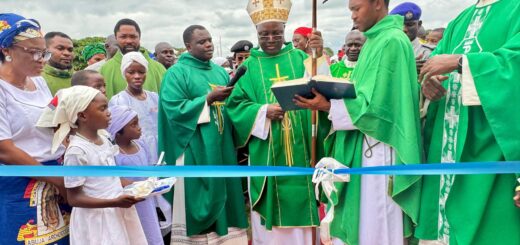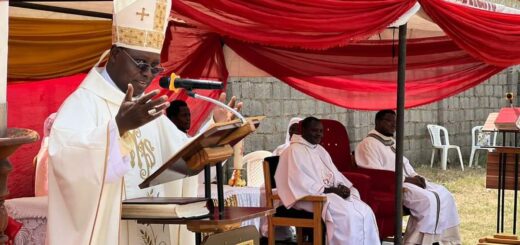Jesus, the Bread of Life
by ARCH BISHOP · August 4, 2024
18th Sunday, Year B, St. William’s Pastoral Area, Pwambara,
04.08.2024. Homily, by Archbishop I.A. Kaigama.
Readings: Exodus 16: 2-4, 12-15,31a; Ephesians 4:17,20-24; John 6:24-35
Jesus, the Bread of Life
St. Paul asks in Romans 8: 35, “Who will separate us from the love of Christ? Tribulation? Or anguish? Or famine? Or nakedness? Or peril? Or persecution? Or the sword?”
What is your answer, you parishioners of St. William’s Pastoral Area, Pwambara?
I have come to pray with you today and hopefully to inspire you to remain strong in the faith, despite the vicissitudes of life; to encourage you to deepen your faith and commitment to Christ and the Church. We shall celebrate not only the sacrament of the Eucharist, but also the sacrament of Confirmation for 215 candidates, and after Mass, we shall bless your new rectory.
When your priest Rev. Fr. Christopher Mbamalu, informed me that the candidates for confirmation are ready and that you have also built a new priest’s house, I was greatly impressed at the rapid growth of your pastoral area, both physically and spiritually, since the last time I came in 2021 to install the tabernacle in your church. Congratulations!
In the first reading from Exodus, we hear about the Israelites journeying through the desert, complaining about hunger. They grumbled against Moses and Aaron, which was also a way of grumbling against God. God responded by providing them with manna from heaven, sustaining them through their journey to the promised land. This narrative reminds us of God’s faithfulness and constant care for His people, even amid challenges and uncertainties. How I wish our leaders too can listen to our cry for help and intervene and remedy the present situation of our country.
Jesus performed the miracle of the multiplication of the loaves and fish as we read in the gospel for last Sunday, (cf. Jn 6: 1-15). Some people continued to follow Him because they wanted more bread. Theirs was a materialistic reason for following Christ, not spiritual. We are no different nowadays. Many come to Church not necessarily to honour, praise, and glorify God for all He is, and all He does for us, but come with a shopping list, as if on a commercial trip to a supermarket. The list may include fruit of the womb (children), marriage, job, healing from sickness, miracles, wealth, etc. All these are legitimate needs, but we need to do better coming to worship God.
Knowing that after the multiplication of bread, people were flocking to Him, seeing only material satisfaction, Jesus taught them to go after the bread that lasts. He says, “I am the bread of life,” meaning that He not only multiplies bread, but He is also the bread which nourishes us spiritually and strengthens our communion with Him and with one another.
Our aim in following Jesus should be as Paul says in the second reading to “give up your old way of life … put aside your old self … be renewed by a spiritual revolution.” We must therefore purify our intentions in following Him.
After God provided the people with manna from above, He told them as we read in the first reading to collect what they needed for each day. Jesus taught us the same lesson when He taught His disciples to pray, “Give us this day our daily bread.” I always hear some persons saying during the Our Father, “Give us these days.” They are not too trusting, to pray for only one day. You don’t blame them, considering the high costs of food items, especially today. They don’t want to take chances (perhaps they are afraid, that, maybe by the time they go back tomorrow, to ask or buy, it would have finished or the price would have doubled as is the case in our Nigerian market today), so they ask for bread for many days instead of one day at a time. I believe that some of us would even ask for not only daily bread, but for the whole bakery! The good news however is that, no matter how difficult life may be, for those who trust in God, and live one day at a time, the manna falls every day.
If we want a steady guarantee of daily bread, we do not fold our arms. St. Paul urges that “The one who is unwilling to work shall not eat.” God has given us large arable and fertile land; all we need is for our government to mechanize farming and modernize livestock production. Our farmers still toil to make yam heaps manually; our pastoralists must wander from place to place with their cattle, hence, causing the herder/farmer crises.
Our leaders can create a system whereby people are motivated to produce the bread they need. They shouldn’t just give palliatives, but give people the conducive environment and empower them with the necessary modern tools and check those officials who divert fertilizer, tractors, etc., meant for the farmers. The adage that “a hungry man is an angry man.” was demonstrated by the people of Israel in the desert in their hunger. They grumbled and rebelled against Moses and God. They quickly forgot the countless acts of goodness and mercy God had shown them, including the torturing of their oppressors with the ten plagues (cf. Exodus 7-12), the miraculous parting of the Red Sea (cf. Exodus 14:21-31), and the turning of bitter water for them into sweet water at Marah, so that they could drink (cf. Exodus 15:22-25).
We must learn not to lose sight of God’s providence in times of hardship, trials and tribulations. While all must be done to satisfy our bodily hunger, the Gospel of today reminds us: “Do not work for food that perishes but for the food that endures to eternal life, which the Son of Man will give you.” We are not to fixate only on the material blessings God provides. Instead, we are to recognize that there is something far greater than these temporary provisions—Christ Himself, the eternal Bread. The same Christ who fed the hungry also offers in the Eucharist, His flesh for us to eat, emphasizing its greater importance over physical food.
May Our Lady Queen of Nigeria who knows our situation tell her Son Jesus, “they are hungry, they have no food.”




